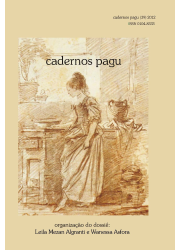Abstract
Este artigo tem como base um trabalho etnográfico de longa duração realizado na Índia rural (Gujarate) com um grupo de mulheres Dalit (termo pelo qual são designados os “antigos” intocáveis da Índia) e, por extensão, mulheres de outros grupos sociais. Pretendo analisar a forma como a produção, distribuição e confecção de alimentos funcionam simultaneamente como formas de segregação feminina e de afirmação de poder por parte das mulheres, sobretudo em situações ligadas à fecundidade.
Abstract
This article is grounded on a long-term fieldwork carried out in rural India (Gujarat) with a group of Dalit women (the term for which are designated the “old” untouchables of India) and, by extension, with women from other social groups. I intend to analyze how food production, distribution, and cooking operate both as a form of segregation and of women’s assertion of power, particularly in situations related to fertility.
Key Words: Dalit, Gender, Food Codification, India.
References
ABBÉ CARRÉ. The Travels of the Abbé Carré in India and in the New East, 1672-1674, vol. II. Nova Delhi, Asian Educational Services, 1990.
APPADURAI, Arjun. Is Homo Hierarchicus? — A Review Essay. American Ethnologist, vol. 13, nº 4, 1986, pp.745-761.
__________. Gastro-ploitics in Hindu South Asia. American Ethnologist, vol. 8, nº 3, 1981, pp.494-511.
BAYLEY, Susan. Caste, Society and Politics in India. From the Eighteenth Century to The Modern Age. Cambridge, Cambridge University Press, 1999.
CARLETTI, Francesco. La Cité dês Plaisirs. In : CHANDAIGNE, Michel. (org.) Goa 1510-1685. L’Inde portugaise, apostolique et commercial. Col.
Mémoires, 41, Paris, Autrement, 1996, pp.160-180.
CHEUNG, Sidney C.H. e CHEE-BANGH, Tan. (orgs.) Food and Foodways in Asia. Resource, Tradition and Cooking. Londres e Nova Iorque, Routledge, 2007.
CIVITELLO, Linda. Cuisine and Culture. A History of Food and People.
Nova Jérsia, John Willey and Sons, 2008.
COLLINGHAM, E. M. Imperial Bodies. The Physical Experience of the Raj, c. 1800-1947, Oxford, Polity Press, 2001.
COLLINGHAM, Lizzie. Curry. A tale of cooks and conquerors. Londres, Vintage Books, 2006.
COUNIHAN, Carole M. e STEVEN L. Caplan. (orgs.) Food and Gender.
Identity and Power. Biblioteca electronic, Taylor and Francis, 2005.
COUNIHAN, Carole M., Around the Tuscan Table. Food, family and gender in Twentieth-Century Florence. Nova Iorque e Londres, Routledge, 2004.
DÉTIENNE, Marcel and Jean-Pierre Vernant. The Cuisine of Sacrifice among The Greeks. Chicago, University of Chicago Press, 1989.
[tradução de Paula Wissing] DIRKS, Nicholas B. Castes of Mind. Colonialism and the Making of British India. Princeton, Princeton University Press, 2001.
DOUGLAS, Mary. De la Souillure. Essay sur les notions de purité et de tabou. Paris, Editions de la Découverte, 1966.
DUMONT, Louis. Homo Hierachicus. Essai sur le Système de Castes en Inde. Paris, Gallimard, 1966.
GOODY, Jack. Food and Love: a Cultural History of East and West, Londres e Nova Iorque, Verso, 1998.
__________. Cooking, Cuisine and Class: A Study in Comparative Sociology. Nova Iorque, Cambridge University Press, 1982.
INDEN, Ronald. Imagining India. Oxford, Basil Blackwell, 1992.
KINSLEY, David R. Hindu Goddesses. Delhi, Motilal Banarsidass e The University of California Press, 1986.
LEONG-SALUBIR, Cecilia, Food Culture in Colonial Asia. A Taste of Empire. Londres e Nova Iorque, Routledge, 2011.
LÉVI-STRAUSS, Claude. Le Cru et le Cuit. Paris, Plon, 1964.
__________. Le Totémisme Aujord’hui. Paris, Presse Universitaire de France, 1962.
LUDDEN, David. Making India Hindu. Religion, Community and the Politics of Democracy in India. Delhi, Oxford University Press, 1996.
MALAMOUD, Charles. Cooking the World: Ritual and Thought in Ancient India. Delhi, Oxford University Press, 1996.
MAUSS, Marcel. The Gift: Forms and Functions of Exchange in Archaic Societies. Nova Iorque, Norton, 1967 [1925].
MEIGS, Anna S. Food, Sex and Pollution: A New Guinea Religion. New Brunswick, Rutgers University Press, 1984.
MINTZ, S.W. e DU BOIS. C.M. The anthropology of food and eating.
Annual Review of Anthropology 30, 2002, pp.99–119.
PEREZ, Rosa Maria. O Tulsi e a Cruz. Antropologia e Colonialismo em Goa. Lisboa, Círculo de Leitores/Temas e Debates, 2012.
PEREZ, Rosa Maria. Feeding Status: Food and Social Stratification in Goa. In: VARADARAJAN, Lotika. (org.) Indo-Portuguese Encounters.
Jorneys in Science, Technology and Culture, vol. I. Nova Delhi, Indian National Science Academy, 2006a, pp.80-98.
__________. The limits of feminism. Women and untouchability in rural Gujarat. In: FRUZZETTI, Lina e TENHUMEN, Sirpa. (orgs.) Culture, power and agency. Gender in Indian ethnography. Kolkata, Stree, 2006b, pp.90-109.
__________. Kings and Untouchables. A Study of the Caste System in Western India. Delhi, Chronicle, Prefácio à edição inglesa, 2004.
__________. Hinduísmo e Cristianismo em Goa. In: PEREZ, Rosa Maria et alii (orgs.) Histórias de Goa. Lisboa, Instituto Português de Museus, 1997, pp.107-121.
POLLOCK, Nancy J. These Roots Remain: Food Habits in Islands of the Central And Eastern Pacific since Western Contact. Honolulu, Institute for Polynesian Studies, 1992.
RAHEJA, Gloria. The Poison in the Gift.Ritual, Prestation, and the Dominant Caste in an Indian Village. Chicago, University of Chicago Press, 1992.
RICHARDS, Audrey. Hunger and work in a savage tribe: a functional study of nutrition among the Southern Bantu. Londres, Routledge & Kegan Paul, 1932.
WATSON, J.L. e CALDWELL, M.L. (orgs.) The Cultural Politics of Food and Eating: A Reader. Malden, Blackwell, 2005.

